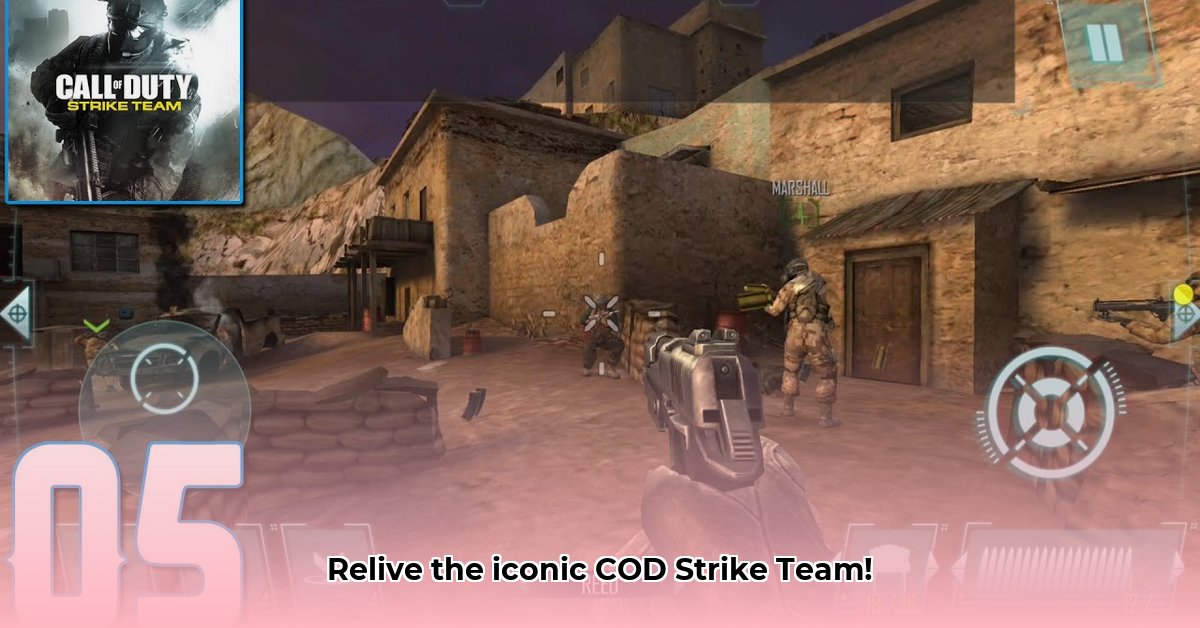
A Bold Attempt, a Mixed Result: Revisiting Call of Duty: Strike Team
- The year Call of Duty: Strike Team dared to bring the franchise's signature blend of first-person shooting and strategic squad management to mobile devices. This wasn't simply a port; it was an ambitious attempt at a hybrid genre, attempting to simultaneously emulate the visceral thrill of an FPS and the tactical depth of an RTS, all within the confines of touchscreen controls. Did it succeed? Let's delve into this retrospective review. For more modern mobile shooters, check out Modern Strike Online.
The game's central innovation lay in its seamless shift between a zoomed-out RTS perspective, where you directed your squad's movements and actions, and a first-person view for direct combat. This innovative approach promised a dynamic and engaging experience, effortlessly blending high-level strategy with close-quarters firefights. But in practice, the execution fell short. The touchscreen controls, a crucial element in any mobile game, presented a significant challenge. Precise aiming, fundamental to any shooter, proved frustratingly difficult. Was this a limitation of the technology in 2013, or were design choices ultimately to blame? The answer, likely, is a combination of both. The hardware of the time simply couldn't match the demands of such a complex control scheme, and perhaps the implementation didn't fully consider the unique limitations of the touchscreen interface.
The narrative, too, suffered. Many players found the storyline confusing and disjointed, failing to capture the same gripping engagement found in its console counterparts. A stronger, more focused narrative might have offset some of the frustrations arising from the clunky controls. One might argue that a less ambitious story, tailored to the game's potential limitations, could have enhanced the overall experience. This highlights the often-overlooked importance of a well-crafted storyline, even in action-heavy games.
Despite these shortcomings, Strike Team did manage to nail one key aspect: its progression system. Unlocking new weapons, upgrades, and employing an earn-to-upgrade system effectively incentivized continued play. This carefully designed progression loop kept players engaged, even when battling the game's control limitations. Yet, the question remains – was this compelling progression loop enough to overcome the significant drawbacks in controls and the lackluster storyline? That's ultimately a subjective assessment, varying greatly from player to player.
Analyzing Strike Team requires considering the context of its release. The mobile gaming landscape of 2013 was vastly different from today's. Mobile phones possessed far less processing power, and the expectation for multiplayer modes, now standard in many mobile shooters, was less prevalent. The absence of a multiplayer mode, a significant omission by today's standards, wasn't as unusual or damning for a mobile game then. This historical context underscores the notable technological limitations that hindered Strike Team's potential. Certainly, the lack of online interaction likely contributed to a less enduring player base, lacking the competitive and collaborative elements that tend to foster long-term engagement in modern mobile games.
A Retrospective Analysis: Lessons Learned From Call of Duty: Strike Team
Three Pivotal Points:
- The game's ambitious hybrid FPS/RTS design was ahead of its time, but flawed execution, especially regarding the control scheme, hindered its success.
- The weak narrative failed to provide a compelling context for the gameplay, leaving many players unenthused.
- The effective progression system, while commendable, could not entirely compensate for the game's central flaws.
In conclusion, Call of Duty: Strike Team represents a fascinating case study in mobile game development. While it didn't achieve widespread success, it pushed boundaries and explored innovative gameplay mechanics. Its failures, however, serve as valuable reminders of the importance of well-designed controls, a captivating narrative, and the synergy between ambitious design and technological limitations. Would a modern iteration, improved with today’s technology and design sensibilities, prove more successful? Only a hypothetical remake can provide that answer. But it's a question worth pondering, given the potential of its core concept and the significant advancements in mobile gaming since 2013. The legacy of Strike Team is one of a bold experiment, a lesson learned, and potential yet untapped.
⭐⭐⭐⭐☆ (4.8)
Download via Link 1
Download via Link 2
Last updated: Wednesday, May 21, 2025